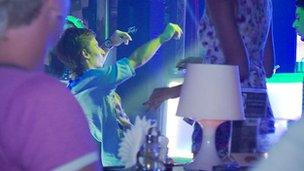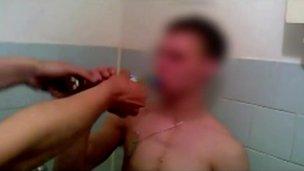Brutal videos fuel Russian anti-gay campaign
- Published

A Russian gay club: Some say victimisation now is worse than in the USSR
At the Lighthouse Cabaret Club in Sochi, host city of the 2014 Winter Olympics, the music is loud, the tobacco smoke thick and the dance floor packed with gay couples enjoying an evening out.
It is a relaxed atmosphere. And from the smiles and open displays of affection here, you may think that being gay in Russia is not a problem.
But the club's co-owner, Andrei Tanichev, tells a different story.
"There's more aggression and it's becoming more dangerous on the streets," Andrei tells me.
"Many gay people have changed how they dress, they've removed earrings, changed their hairstyles, to avoid having problems. Even back in the USSR, where homosexuality was a criminal offence, gays were treated better than they are now in Russia. Ordinary people see us as criminals. They hate us."
Brutal videos
There is evidence of that attitude in a series of shocking videos posted online by a Russian vigilante group. In one, a man is being forced to drink urine to "cure him" of being a homosexual.

A Russian anti-gay vigilante video shows a victim forced to drink urine
Then a metal bucket is placed over the man's head and hit with what looks like a baseball bat and a police truncheon.
Attacks like this, filmed and posted online, are being carried out across Russia by an ultra-nationalist group. It claims its objective is to name, shame and punish suspected paedophiles.
But from the tone of the videos the encounters come across as homophobic attacks. In another online clip, a woman armed with a gun and dressed in camouflage jokes that she's "out on safari" hunting for paedophiles and gays. She starts shooting towards an imaginary "rainbow target".
The woman's name is Yekaterina. We track her down in St Petersburg, where she heads the local branch of the vigilante group "Occupy Paedophilia".
"Our priority is uncovering cases of paedophilia," Yekaterina explains to me. "But we're also against the promotion of homosexuality. And if - along the way - we encounter people of non-traditional sexual orientation, we can kill two birds with one stone."
Controversial law
In Russia gay-rights activists believe such aggression is a direct result of the controversial new law signed by President Vladimir Putin. The legislation bans the spread of information about "untraditional sexual relations" to anyone under 18. It portrays homosexuality as a danger to children and the family.
"The law itself is not a danger in terms of its application. But it's a great danger in terms of what kind of opinions it shapes," believes Anastasiya Smirnova of the human rights group Russian LGBT Network. "It entitles people to mob rule, to organised violence against those they perceive to be dangerous to society, to families and to children. People take over the role of the authorities to react against what they think is a violation."
Moscow has come in for huge international criticism over this law. There have even been calls in the West for a boycott of next year's Winter Olympics in Sochi. The Russian authorities believe that is a massive overreaction. After all, they have not banned homosexuality, merely restricted the spread of information about it.
But why have they done that?
Part of the reason is that the Orthodox Church and the state are forging a new national identity for Russia, based on traditional conservative values. There is no room for Western liberal ideas - social, political or sexual.
"Why should we respect all your traditions and you not respect ours?" asks St Petersburg MP Vitaly Milonov, one of the architects of the legislation.
"Aggressive pushiness to accept your values is unfair. We don't tell the Queen of England not to sign a law on same-sex marriages in your country. We have no right to do that, because we respect your independence. Why do you not accept ours?
"We do not attack any sexual minorities. They have absolutely the same rights. But they should not try to change the Russian traditions supported by 90% of the population. For the traditional Russian population, homosexuality is a sin."
Back at the gay cabaret in Sochi, club owner Andrei believes the debate about homosexuality is designed to distract Russians from more pressing problems at home and to unite the country behind the government.
"Your average Russian citizen sitting at home watching TV now understands who he needs to fight against, who the enemy is," Andrei tells me. "It's gays - and the Western countries who support them. And the more the West supports gays in Russia, the more Russian people hate us - because the accepted wisdom here is that the West is evil."
- Published13 August 2013
- Published12 August 2013
- Published30 July 2013